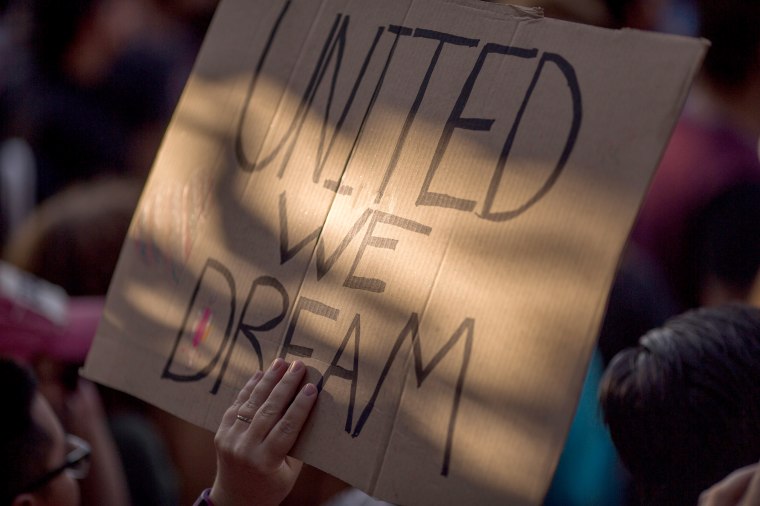WASHINGTON — The White House is preparing to send a list of immigration proposals to Capitol Hill in the coming days, including backing for a bill that would make it easier for local police to question people they stop about their immigration status, according to four people familiar with the conversations.
One source described the package as the "wish list" of Stephen Miller, senior policy adviser to President Trump and a known immigration hardliner.
A senior administration official and three other sources familiar with the deliberations say the proposal includes part of the Davis-Oliver Act, which has been criticized by Democrats and some Republicans. The bill requires police to report to the Department of Homeland Security all identifying information on anyone they encounter who is suspected to be in the country illegally.
It's a controversial piece of a plan intended to delineate the administration's immigration priorities as Congress considers how to handle the DACA (Deferred Action for Childhood Arrivals) program, created by President Barack Obama to allow immigrants who were brought into the U.S. illegally as children to remain.

The administration announced it would rescind the program last month, giving Congress six months to come up with a legislative solution before DACA recipients would be eligible for deportation. Some had speculated that the White House would demand that the hard-line policies be pushed through Congress before agreeing to sign a DACA bill, but the sources have suggested that will not be the case.
"At a time of so much tragedy in our country, we need President Trump to focus on real solutions, like ensuring that Congress passes the bipartisan Dream Act rather than putting forth more xenophobic proposals," said Marielena Hincapie, executive director of the National Immigration Law Center. The Dream Act refers to a bill that would make the DACA program into law.
Two sources familiar with the deliberations say the White House is seeking to strengthen some of its positions on immigration ahead of the debate over DACA. But a senior administration official said the White House is not proposing that all of these priorities become law before signing onto a DACA bill, as some will be difficult to pass. "It's not a demand," the official said.
"I don't expect what they put forth to go over very well."
Another potentially divisive piece of the White House plan is expected to include support for the RAISE Act, which would put new limits on the number of people who can enter the United States legally through work permits. The administration is also expected to seek more funding for more immigration agents, border patrol and judges, said the four sources.
Stephen Miller is driving the deliberations, which have been underway for several weeks. Miller, who worked for Jeff Sessions when the Attorney General was a senator from Alabama, is leading negotiations with some Republican senators to move any deal to address the legal status of Dreamers to the right, one senior Republican Senate aide said.
"I don't expect what they put forth to go over very well," one of the sources said.
Republicans Lay Down New Guidelines
Addressing the green card system as part of any DACA fix surfaced after President Donald Trump met with Democratic leaders. The Democrats emerged from the meeting saying a "deal" to address Dreamers was in the works. That "deal" was to address the status of Dreamers and provide some funding for border security, but not a physical border wall.

But Trump met with five Republicans over dinner on Monday night where they laid down a new set of guidelines to reset the discussions on DACA. They included border security and a DACA fix but also partially doing away with so-called chain migration that allows family members of legal immigrants to immigrate to the United States. They argued for using the RAISE Act to create a merit-based system where immigration is determined by education level and other non-familial factors.
"What we've done is try to plant a flag about what it is we would stand for what we would want," Sen. David Perdue, R-Ga., said of the meeting with Trump. "These are the pieces of the puzzle that we're trying to come together and what the president did last night is raise the priority and get us organized about what it is we're all trying to accomplish."
But the RAISE Act is controversial even among Republicans. When it was first introduced earlier this year by Perdue and Sen. Tom Cotton, R-Ark., many Republicans dismissed it. But it's gotten a boost with the White House because of hard-line adviser Miller and the need to address Dreamers whose reprieve from deportation will expire in March.
Sen. Jeff Flake, R-Ariz., who introduced his own DACA fix that includes border security and allowing Dreamers a path to legalization, said that including a merit-based system will derail any deal on DACA.
"I doubt that you'll have enough time to do the kind of legislating or horse trading, whatever you want to call it, to deal with legal immigration. I think the most likely thing [a deal] will have is a DACA fix and some border security element," Flake said.
Miller's positions are not shared by everyone inside the White House. For example, current chief of staff John Kelly had previously served as Trump's Secretary of Homeland Security, where he acknowledged there were "push factors" such as violence and poverty driving many Central Americans to the United States. Kelly has said he met with hundreds of members of Congress to find a solution to DACA.
As a result of the differing opinions at the White House, the sources said the priorities could change before they are finally released to Capitol Hill as soon as this weekend.


